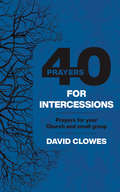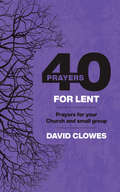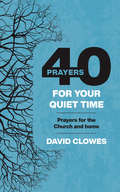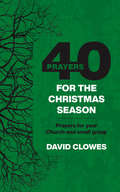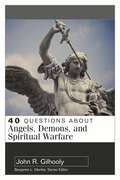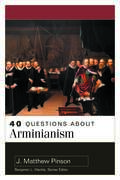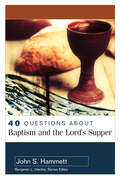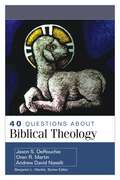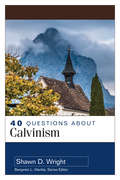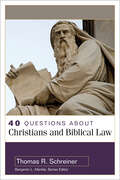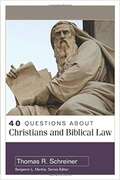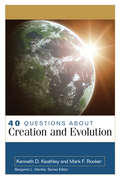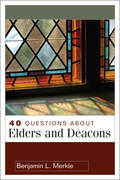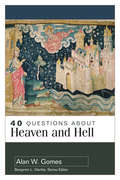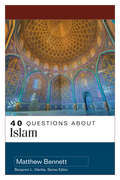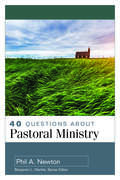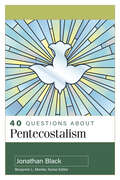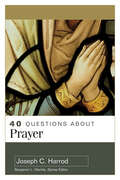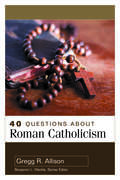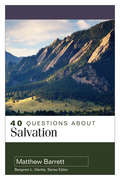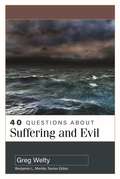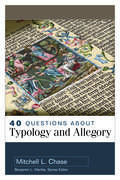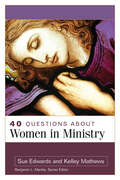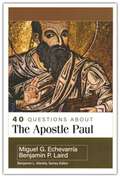- Table View
- List View
40 Prayers for Intercessions
by David ClowesFor use in Churches, small groups, and for your own devotional time, 40 Prayers for Advent provides simple, accessible prayers for use during the Advent season. Adapted from the popular 500 Prayers series and written in everyday language, this book is the perfect resource to help mark one of the most important seasons in the Christian calendar.
40 Prayers for Lent
by David ClowesFor use in Churches, small groups, and for your own devotional time, 40 Prayers for Advent provides simple, accessible prayers for use during the Advent season. Adapted from the popular 500 Prayers series and written in everyday language, this book is the perfect resource to help mark one of the most important seasons in the Christian calendar.
40 Prayers for Your Quiet Time: Prayers for the Church or home
by David ClowesRevitalise and bring new depth to your personal times of devotions with the simple, accessible prayers of 40 Prayers for Your Quiet Time. Adapted from the popular 500 Prayers series and written in everyday language, this book is the perfect resource to help make your own time of prayer and reflection—and time spent as a family, small group, or couple—a deeper and richer encounter with God.
40 Prayers for the Christmas Season: Prayers for your Church or small group
by David ClowesFor use in Churches, small groups, and for your own devotional time, 40 Prayers for the Christmas Season provides simple, accessible prayers for use between Christmas and Epiphany. Adapted from the popular 500 Prayers series and written in everyday language, this book is the perfect resource to help mark one of the most important seasons in the Christian calendar—yet one often neglected in the demands of Christmas and the New Year.
40 Questions About Angels, Demons, and Spiritual Warfare (40 Questions Series)
by John R. GilhoolyIn 40 Questions About Angels, Demons, and Spiritual Warfare, John Gilhooly provides a biblical and balanced perspective on the many issues surrounding the spiritual realm. Using a question-and-answer format, he explains spiritual warfare, angels and demons, the role of Satan, models and practices for spiritual warfare, and topics related to the occult. Beneficial as a comprehensive overview or as a reference guide to particular subjects, this volume provides concise but thorough answers to many important questions, including: - Do believers have guardian angels? - Can Christians be demon possessed? - Are there territorial spirits? - Why and when did the devil fall from heaven? - What is the role of prayer in spiritual warfare? - Are there such things as spiritual curses?
40 Questions About Arminianism (40 Questions series)
by J. Matthew PinsonThe actual life and teaching of Jacobus Arminius are often unknown or misunderstood across many Protestant traditions. Answers beyond a basic caricature can be elusive. What are the essential historical backgrounds of Arminianism, and what theological teachings connect to the Arminian point of view? Mixing solid historical research with biblical and doctrinal precision, Baptist scholar J. Matthew Pinson clarifies the foundations of this influential tradition.40 Questions About Arminianism addresses the following questions and more:• Who was Jacobus Arminius?• How has the church interpreted God’s desire that everyone be saved?• How is Arminianism different from Calvinism?• Can one be both Reformed and Arminian?• What is “universal enabling grace”?• What do Arminians mean by “free will”?• Do Arminians believe that God predestines individuals to salvation?• Is it possible for a Christian to apostatize?An accessible question-and-answer format helps readers pursue the issues that interest them most and encourages a broad understanding of historic and contemporary Arminianism, with additional resources available at 40questions.net.
40 Questions About Baptism and the Lord's Supper (40 Questions Series)
by John S. HammettAppropriate for the student and thoughtful layperson, 40 Questions About Baptism and the Lord's Supper answers forty of the most common and most difficult questions about the two Protestant ordinances. There is significant diversity of views on these subjects and the skilled, evenhanded biblical analysis sheds lights on the many theological and pastoral considerations regarding baptism and communion. Baptism and the Lord's Supper are practiced by almost all Christian churches, but they disagree on the meaning, proper participants, even the proper names for these observances. This book includes the major theological issues (such as infant baptism, open and closed communion, and the nature of God's activity in these celebrations), the views held by different denominations (from Roman Catholic to Lutheran, Reformed, Baptist, and others), and a number of practical issues (such as the proper age at which to baptize a child, the frequency with which the Lord's Supper should be observed, and whether these two practices should be observed only in churches). This volume will be helpful to pastors, worship leaders, college and seminary students, and of interest to all Christians who want to grow in their understanding of these two basic Christian acts of worship. Each chapter is succinct and readable, with footnotes indicating additional sources for those who wish to go further.
40 Questions About Biblical Theology (40 Questions Series)
by Andrew David Naselli Oren R. Martin Jason S. DeRouchieTo understand what the entire Bible teaches about any given subject, we must practice biblical theology. By surveying the whole canon of Scripture, we can best discern what God has revealed about any particular issue. But doing so requires answering a number of important questions: - What type of biblical theology will we choose? - What overall story does the Bible tell? - How should we understand the relationship between the Old and New Testaments? - How does our topic fit within salvation history? - How do we apply the truths we discover? 40 Questions About Biblical Theology provides resources to answer these key questions in order to guide readers in their own study and practice of biblical theology. Other vital topics the authors address include how to understand typology, key themes in biblical theology, and how Christians should relate to Old Testament promises. Ideal for courses on biblical theology, for pastors, and for anyone who teaches or interprets Scripture, 40 Questions on Biblical Theology will deepen your understanding and application of the whole counsel of God.
40 Questions About Calvinism (40 Questions Series)
by Shawn D. WrightIn 40 Questions About Calvinism, church historian Shawn D. Wright tackles many issues about the theological system known as Calvinism. Taking an irenic approach, Wright explains the key doctrines while also contrasting them with Arminianism. The accessible format allows readers to easily look up topics they're most interested in, including: What is the difference between Calvinism and the Reformed tradition?What is predestination?Did Jesus die for the sins of the whole world?Can people resist the Holy Spirit?Do Calvinists practice evangelism and missions?For Calvinists or those seeking to understand Calvinism better, 40 Questions About Calvinism helps readers understand the key terms, issues, and debates of this highly influential theological viewpoint.
40 Questions About Christians and Biblical Law (40 Questions Series)
by Thomas R. SchreinerThis volume by Dr. Thomas R. Schreiner on the interplay between Christianity and biblical law is an excellent addition to the 40 Questions & Answers series. Schreiner not only coherently answers the tough questions that flow from a discussion about the Old Testament Levitical Law, but also writes clearly and engagingly for the student. The pastor, student, and layperson can easily understand Schreiner's biblical theology of the Law. The reader will enjoy the clarity and encouragement of 40 Questions About Christians and Biblical Law. The simple Q&A format allows readers to skip to questions of interest. Questions include: - What does the word law mean in the Scriptures? - Was the Mosaic covenant legalistic? - Does the OT teach that salvation is by works? - What does the expression "works of law" mean in Paul? - Is perfect obedience to the law mandatory for salvation? - Does Paul teach that the OT law is now abolished? - What does Paul mean by "righteousness of God?" - Does the Pauline teaching on justification contradict Jesus' message? - Do James and Paul contradict one another on justification by works? - How should we understand the role of the law in Luke-Acts? - What is theonomy, or Christian reconstructionism, and how should it be evaluated? - What role does the law have in preaching?
40 Questions About Christians and Biblical Law (40 Questions and Answers)
by Thomas R. Schreiner Benjamin MerkleThis volume by Dr. Thomas R. Schreiner on the interplay between Christianity and biblical law is an excellent addition to the 40 Questions & Answers series. Schreiner not only coherently answers the tough questions that flow from a discussion about the Old Testament Levitical Law, but also writes clearly and engagingly for the student. <p><p> The pastor, student, and layperson can easily understand Schreiner’s biblical theology of the Law. The reader will enjoy the clarity and encouragement of 40 Questions About Christians and Biblical Law.
40 Questions About Creation and Evolution (40 Questions & Answers Series)
by Kenneth Keathley Mark F. RookerBiblically and scientifically informed answers to pressing questions about the creation-evolution debateThis accessible volume evenly addresses the issues of modern science and the scriptural texts. The conservative evangelical authors are well-informed on contemporary scientific views of the universe and also carefully exegete the biblical texts that pertain to creation. They irenically consider the various angles of the debate and make constructive suggestions to reconcile science and the Bible.Those who are curious about the origins of life and the universe will want to read this book. Seminary students and serious college students will find this information critical, as an understanding of creation is vital to an effective apologetic in sharing the faith.
40 Questions About Elders and Deacons (40 Questions Series)
by Benjamin L. MerkleOrganized around common FAQs, 40 Questions About Elders and Deacons tackles the major questions that pastors, church leaders, and students ask about congregational church government, a topic of significant interest in the church today. It provides readers with a clear analysis of key biblical passages and succinct answers (4-8 pages each). The unique format of the book allows readers to pick and choose what issues are most pertinent to their interests and needs. Thought-provoking discussion questions for each topic make it ideal for either personal or church-wide study.
40 Questions About Heaven and Hell (40 Questions Series)
by Alan W. GomesIn 40 Questions About Heaven and Hell, Alan Gomes surveys the Old and New Testaments to present a comprehensive picture of the afterlife. The question-and-answer format makes it easy to find answers to specific questions on heaven, hell, the intermediate state, the final judgment, and life in eternity. Readers will find solid answers to many vital questions:What should we conclude about those who claim to have seen heaven or hell?Is it possible for us to communicate with the dead?Is there such a place as purgatory?What will our resurrected bodies be like?What will we do in the eternal state?Will there be animals in the eternal state?What is hell like?How can a God of love send people to an eternal hell?Did Jesus "descend into hell" like the Apostles' Creed says?Study notes point to additional resources for learning, and reflection questions at the end of each chapter make the book ideal for small group studies.
40 Questions About Islam (40 Questions Ser.)
by Matthew BennettA much anticipated new addition to the very popular and practical book series that answers real questions on key topics in contemporary ChristianityIslam is one of the most significant forces shaping the world today, but most Christians are confused about its key beliefs and practices. Many wonder about the apparent similarities and obvious differences between Christianity and Islam, and want to reach out to Muslim friends or neighbors with the gospel but don’t know where to begin. Having spent several years living in North Africa and the Middle East, missions professor Matthew Bennett guides readers through Islam’s key tenants and provides answers to critical questions, such as:•Who was Muhammad and what was his message?•Do Muslims and Christians worship the same God?•What are the differences between the Qur’an and the Bible?•What is shariah law?•What is the Islamic view of salvation?•What happens in the mosque?•Is Islam inherently misogynistic?•Do Muslims and Christians worship the same God?•How should a Christian share the gospel with Muslims?•Helpful summaries at the end of each chapter encapsulate important information, followed by discussion questions useful for personal or small-group study. Whether you want to understand Islam better or reach Muslims for Christ, 40 Questions on Islam is an indispensable primer and reference book.
40 Questions About Pastoral Ministry (40 Questions Series)
by Phil A. NewtonA veteran pastor answers the questions that today's pastors are askingIn 40 Questions about Pastoral Ministry, veteran pastor Phil Newton provides trustworthy answers to 40 of the most common and pressing questions relating to the life and work of the pastor. Covering five major categories--such as development, practices, and preaching--Newton equips pastors to successfully handle everyday duties and challenges, including:• Remaining spiritually healthy• Strengthening your marriage• Dealing with discouragement• Avoiding pitfalls• Leading elders' meetings• Mentoring future leaders• Preaching through books of the Bible• Conducting marriages and funerals• Practicing church discipline• Leading change and revitalization, and much moreBasing his answers on Scripture, theological reflection, and personal experience, Newton serves as a mentor and guide for pastors at every stage of ministry. The questions and answers are self-contained, and topics of interest can be easily located. Pastors will want to consult this volume often for authoritative advice on all aspects of pastoral ministry.
40 Questions About Pentecostalism (40 Questions Series)
by Jonathan BlackAt just over a century old, the Pentecostal Movement accounts for over 500 million believers worldwide and continues to grow. Still, confusion abounds over what Pentecostals believe and teach about the Holy Spirit, worship, salvation, healing, and much more. In 40 Questions About Pentecostalism, Jonathan Black provides an accessible overview of the historical, theological, biblical, and experiential factors that make Pentecostalism a vibrant and worldwide Christian movement. He answers questions such as these: - How did Pentecostalism begin in the United States? - What do Pentecostals believe concerning the Trinity? - Do Pentecostals affirm the prosperity gospel? - What do Pentecostals believe about healing? - What is speaking in tongues? As with all the 40 Questions books, the question-and answer format offers readers targeted guidance on the questions that matter most to them, and controversial issues are addressed with robust scholarship and in a spirit of grace.
40 Questions About Prayer (40 Questions)
by Joseph C. HarrodRelevant questions about prayer answered from the whole witness of ScripturePraying is often the most common yet least understood practice of Christian spirituality. In 40 Questions About Prayer, scholar and teacher Joseph C. Harrod shares biblical insight on the nature and practice of Christian prayer. Harrod's emphasis on searching the Scriptures results in a trustworthy, practical guide to a vital aspect of Christian belief and behavior, equally appropriate for seminary courses, Bible studies, and personal understanding.The accessible question-and-answer format of 40 Questions About Prayer allows readers to explore the issues they care most about, such as these:• Does prayer change God’s mind?• Does God hear the prayers of unbelievers?• What does it mean to pray in Jesus's name?• How does prayer affect evangelism, spiritual awakening, and revival?• What does it mean to pray “without ceasing” (1 Thess. 5:17)?• Do physical postures affect prayer?
40 Questions About Roman Catholicism
by Gregg R. AllisonStraightforward answers about Roman Catholicism for a Protestant audienceThe Roman Catholic faith is one of the world's most widespread religious traditions, yet the unique aspects of Roman Catholicism elicit perennial questions from adherents and outsiders alike. Such questions tend to fall into three major categories: historical backgrounds, theological matters, and personal relationships. Using Catholic Church documents and the writings of Catholic scholars, Baptist systematic theologian Gregg Allison distills the teachings of Catholicism around forty common questions about Catholic foundations, beliefs, and practices. The accessible question-and-answer format guides readers to the issues that concern them, including:• Where do Roman Catholic and Protestant beliefs differ?• What happens during a Roman Catholic Mass?• How does Roman Catholicism understand the biblical teaching about Mary?• Who are the saints and what is their role?• How can my Roman Catholic loved ones and I talk about the gospel?40 Questions About Roman Catholicism explores theology and practice, doctrine and liturgy, sacraments and Mariology, contributions and scandals, and many other things, clarifying both real and perceived differences and similarities with other Christian traditions.
40 Questions About Salvation (40 Questions & Answers Series)
by Matthew BarrettThis newest contribution to the 40 Questions series continues the tradition of excellent research presented in clear, user-friendly writing. 40 Questions About Salvation makes sense of one of Christianity's most disputed doctrines, covering the most common and difficult questions about election, the order of salvation, and perseverance of the saints.This volume will help pastors, college and seminary students, and all Christians who want to grow in their understanding of what the Bible teaches about salvation. Each chapter is succinct and readable, with a bibliography of additional resources for those who wish to study further.
40 Questions About Suffering and Evil (40 Questions Series)
by Greg WeltyBoth inside and outside the Christian faith, many difficult realities trouble human hearts and minds. By being equipped to answer questions about suffering and evil, Christians can persevere in faith, share their faith, and defend the faith when confronted with these inevitable challenges of living in a fallen world. In 40 Questions About Suffering and Evil, Greg Welty shows the necessity of exploring our vocabulary around evil and suffering so we can clearly see and express the best questions. Welty explores vital ideas, backgrounds, and issues, answering questions like these: - What is the difference between moral Evil and natural Evil? - What is the Bible's role in helping us understand suffering and evil? - Does God will all suffering and evil? - How is the gospel relevant to counseling those who suffer? Welty provides biblically informed intellectual resources for answering significant questions about suffering and evil, exposing readers to a wide range of influential views articulated by Christians over the past two millennia.
40 Questions About Typology and Allegory (40 Questions Series)
by Mitchell L. ChaseA survey of two literary devices that are indispensable for understanding salvation historyA biblical type is a person, place, or thing in salvation history that corresponds to a later person, place, or thing in the scriptural text. An allegory is a passage that says one thing in order to say something else. Both are common literary devices in the Bible that are vital for understanding truths about Jesus Christ found nowhere else.In 40 Questions About Typology and Allegory, Mitchell Chase provides a thorough introduction to both devices, showing where they appear throughout Scripture and the historical roles they have played in biblical interpretation. In a convenient question-and-answer format, Chase answers key questions such as: •Why should interpreters care about typology and allegory? •How do we identify types? •What are the theological assumptions of typology? •Do all types lead to Christ? •What is allegorical interpretation? •How was allegory practiced in the early church? •How should we practice allegorical interpretation?Situating typology and allegory within salvation history, Chase shows how these devices reveal the interconnectedness of Scripture and commonly overlooked aspects of Christ's person and work. Scholars, Bible teachers, and preachers will find this an essential resource for interpreting Scripture more comprehensively.
40 Questions About Women in Ministry (40 Questions)
by Sue Edwards Kelley Matthews40 Questions About Women in Ministry charts a course for understanding differing views on the topic. regarding the ministries of women. The accessible question-and-answer format guides readers to specific areas of confusion, and authors helpfully zero in on the foundations of varied beliefs and practices. Edwards and Mathews cover interpretive, theological, historical, and practical matters such as:What did God mean by the woman as man's "helper"?How is it that Christians reach different conclusions about 1 Timothy 2:11-15?How did Western culture influence the role of women in society and the church? Combining a strong adherence to Scripture, vast academic and ministry experiences, and a commitment to Christ-honoring dialogue, 40 Questions About Women in Ministry is a valuable guide to pastors, ministry leaders, church groups, and seminarians. "Based on extensive research, the authors present various viewpoints fairly and clearly, and offer concise explanations to equip readers to draw their own conclusions on these pressing questions." --Lynn Cohick, Provost/Dean of Academic Affairs, Professor of New Testament, Northern Seminary "Raise the topic of women in the church and the roles they have and you better be prepared to have your blood pressure checked along with the person you are talking to about the topic. Here is a book that calmly lays out the view's pro and con for the array of options the topic yields. It does so evenhandedly." --Darrell Bock, Senior Research Professor of New Testament Studies, Executive Director for Cultural Engagement for The Hendricks Center, Dallas Theological Seminary
40 Questions About the Apostle Paul
by Miguel G. EcevarríaWhat can we know about the apostle Paul, and what difference does it make? Paul of Tarsus was an undeniably forceful presence in the early Christian church, instructing fledgling congregations of believers throughout the Mediterranean in person and by letter and authoring about half of the New Testament in the process. But who was this powerful personality? And how can students most benefit from the extensive studies on Paul available today? New Testament scholars Miguel Echevarria and Benjamin Laird provide an invaluable foundation for students beginning their investigations into the apostle Paul, Paul’s theology, and Pauline studies, addressing orienting questions such as these: • What do we know about Paul’s family? • How did Paul’s companions assist in the composition and distribution of his letters? • Did Paul think his letters were authoritative Scripture? • Is there a center to Paul’s theology? • What is Paul’s Christology? • What are the strengths and weaknesses of the New Perspective on Paul? • Does Paul address slavery and racial division? Through its question-and-answer format, 40 Questions about the Apostle Paul provides a succinct introduction and entryway to more advanced study of Paul and the Pauline letter corpus. Additional resources are available at 40questions.net.
40 Questions About the End Times (40 Questions Series)
by Eckhard SchnabelThis newest contribution to the 40 Questions series continues the tradition of excellent research presented in accessible language and clear writing. Designed for both students and general readers, this resource helps them make sense of one of the Bible's most difficult topics. Eckhard Schnabel, a professor at a leading seminary and the author of several major works, looks at the future of the world, the church, and Israel; the return of Jesus; and the millennium and the final judgment. He answers questions related to the rapture, the 144,000, the identity of the two witnesses, Armageddon, how to interpret Revelation, heaven and hell, and so forth. The result is an even-handed treatment that avoids sensationalism and a "newspaper headline" approach to prophecy, that is, interpreting prophecy according to current events. Rather, Schnabel carefully studies the biblical text in light of its first-century context and draws biblically-based conclusions.
